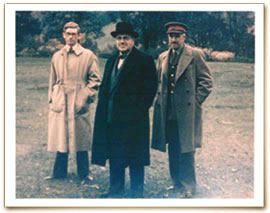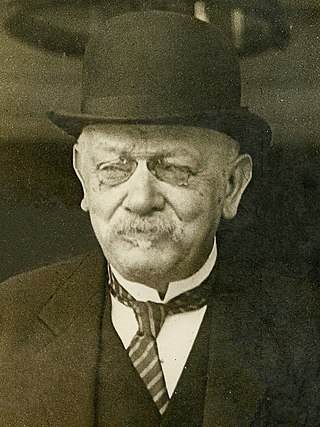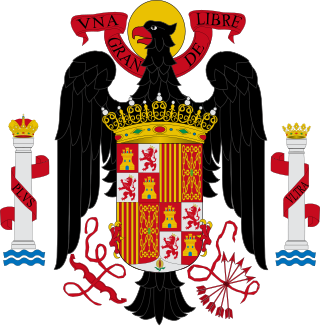
Francisco Franco Bahamonde was a Spanish military general who led the Nationalist forces in overthrowing the Second Spanish Republic during the Spanish Civil War and thereafter ruled over Spain from 1939 to 1975 as a dictator, assuming the title Caudillo. This period in Spanish history, from the Nationalist victory to Franco's death, is commonly known as Francoist Spain or as the Francoist dictatorship.

Pax Britannica was the period of relative peace between the great powers during which the British Empire became the global hegemonic power and adopted the role of a "global policeman".

The Entente Cordiale comprised a series of agreements signed on 8 April 1904 between the United Kingdom and the French Republic which saw a significant improvement in Anglo-French relations. On the surface the agreement dealt with minor issues related to fishing and colonial boundaries. Egypt was recognized as part of Britain's sphere of influence, and Morocco as part of France's. The Entente was not a formal alliance and did not involve close collaboration, nor was it intended to be directed against Germany. However, it paved the way for a stronger relationship between France and Britain in the face of German aggression. It should not be mistaken for the official Anglo-French military alliance, which was only established after the outbreak of World War I in 1914.

Ramón Serrano Suñer, was a Spanish politician during the first stages of the Francoist dictatorship, between 1938 and 1942, when he held the posts of President of the FET y de las JONS caucus (1936), and then Interior Minister and Foreign Affairs Minister. A neofalangist originally from the CEDA, Serrano Suñer came to embody the most totalitarian impetus within the regime. Serrano Suñer was known for his pro-Third Reich stance during World War II, when he supported the sending of the Blue Division to fight along with the Wehrmacht on the Russian front. He was also the brother-in-law of Francisco Franco's wife Carmen Polo, for which he was informally nicknamed Cuñadísimo or the "most brother-in-law".

In the history of the 20th century, the interwar period lasted from 11 November 1918 to 1 September 1939, the end of the First World War to the beginning of the Second World War. The interwar period was relatively short, yet featured many significant social, political, and economic changes throughout the world. Petroleum-based energy production and associated mechanisation led to the prosperous Roaring Twenties, a time of both social mobility and economic mobility for the middle class. Automobiles, electric lighting, radio, and more became common among populations in the developed world. The indulgences of the era subsequently were followed by the Great Depression, an unprecedented worldwide economic downturn that severely damaged many of the world's largest economies.

Sir Francis Harry Hinsley, was an English historian and intelligence officer. He worked at Bletchley Park during the Second World War and wrote widely on the history of international relations and British Intelligence during the Second World War. He was known as Harry Hinsley.

Jules-Martin Cambon was a French diplomat and brother of Paul Cambon. As the ambassador to Germany (1907–1914), he worked hard to secure a friendly détente. He was frustrated by French leaders such as Raymond Poincaré, who decided that Berlin was trying to weaken the Triple Entente of France, Russia and Britain and was not sincere in seeking peace. The French consensus was that war was inevitable.

Sir Paul Preston CBE is an English historian and Hispanist, biographer of Francisco Franco, and specialist in Spanish history, in particular the Spanish Civil War, which he has studied for more than 30 years. He is the winner of multiple awards for his books on the Spanish Civil War.

During World War II, the Spanish State under Francisco Franco espoused neutrality as its official wartime policy. This neutrality wavered at times and "strict neutrality" gave way to "non-belligerence" after the Fall of France in June 1940. Franco wrote to Adolf Hitler offering to join the war on 19 June 1940 in exchange for help building Spain's colonial empire. Later the same year Franco met with Hitler in Hendaye to discuss Spain's possible accession to the Axis Powers. The meeting went nowhere, but Franco did help the Axis—whose members Italy and Germany had supported him during the Spanish Civil War (1936–1939)—in various ways.

In the decades since the Holocaust, some national governments, international bodies and world leaders have been criticized for their failure to take appropriate action to save the millions of European Jews, Roma, and other victims of the Holocaust. Critics say that such intervention, particularly by the Allied governments, might have saved substantial numbers of people and could have been accomplished without the diversion of significant resources from the war effort.
Operation Cascade was the codename for an Allied military deception operation during the Western Desert Campaign of World War II for North Africa. Operation Cascade was one of the first successful Allied deception operations in World War II, and provided valuable experience for later operations.
Robert J. Young is a Canadian historian and former professor of history at the University of Winnipeg (1968–2008). He specializes in 20th century European international politics. A graduate of the University of Saskatchewan and the London School of Economics, Young's doctoral dissertation was written under the supervision of Donald Cameron Watt. It was published by Harvard University Press as In Command of France: French Foreign Policy and Military Planning, 1933-1940. Over the last forty years, Professor Young, a Canadian, has written numerous academic books and articles including France and the Origins of the Second World War and Louis Barthou: Power and Pleasure. Throughout, he has consistently rejected the la décadence thesis that the alleged decadence of France in the 1930s made the Fall of France inevitable.

The Spanish Civil War was a civil war in Spain fought from 1936 to 1939 between the Republicans and the Nationalists. Republicans were loyal to the left-leaning Popular Front government of the Second Spanish Republic, and consisted of various socialist, communist, separatist, anarchist, and republican parties, some of which had opposed the government in the pre-war period. The opposing Nationalists were an alliance of Falangists, monarchists, conservatives, and traditionalists led by a military junta among whom General Francisco Franco quickly achieved a preponderant role. Due to the international political climate at the time, the war had many facets and was variously viewed as class struggle, a religious struggle, a struggle between dictatorship and republican democracy, between revolution and counterrevolution, and between fascism and communism. According to Claude Bowers, U.S. ambassador to Spain during the war, it was the "dress rehearsal" for World War II. The Nationalists won the war, which ended in early 1939, and ruled Spain until Franco's death in November 1975.
Herbert Rutledge Southworth was a writer, journalist and historian specializing in the Spanish Civil War and the subsequent Francoist State in Spain and whose work led the Francoist ministry of information to set up an entire department to counter his demolition of the State's propaganda. He also founded a radio station in Tangier following the end of World War II.

Diplomacy comprises spoken or written communication by representatives of states intended to influence events in the international system.

Eberhard von Stohrer was a career German diplomat who served during World War I and World War II. The son of an Army General from Württemberg, he studied at Leipzig University, receiving a Doctor of Law degree. He also studied at the University of Strasbourg and the School of Political Sciences in Paris.

Gonzalo Queipo de Llano y Sierra was a Spanish military leader who rose to prominence during the July 1936 coup and then the Spanish Civil War and the White Terror.

This article covers worldwide diplomacy and, more generally, the international relations of the great powers from 1814 to 1919. This era covers the period from the end of the Napoleonic Wars and the Congress of Vienna (1814–1815), to the end of the First World War and the Paris Peace Conference (1919–1920).

From 1939 until January 1944, the intelligence services of Germany and Italy, with the assistance of the Spanish government, maintained a network of stations in the vicinity of the Strait of Gibraltar. The stations tracked the movements of Allied warships and merchant vessels and became a valuable source of intelligence to the Axis, for attacks on Allied convoys. The British Government considered attacking the stations on two occasions during 1942 but decided instead to use diplomatic pressure to have them closed. The stations are believed to have ceased operations in January 1944.
Francoist Spain remained officially neutral during World War II but maintained close political and economic ties to Nazi Germany and Fascist Italy throughout the period of the Holocaust. Before the war, Francisco Franco had taken power in Spain at the head of a coalition of fascist, monarchist, and conservative political factions in the Spanish Civil War (1936–1939) with the aid of German and Italian military support. He was personally sympathetic to aspects of Nazi ideology including its anti-communism and anti-Semitism. It appeared possible that Spain might enter into an alliance with the Axis powers in 1940 and 1941. In this period, Franco's regime compiled a register of Jews resident in Spain and added Jewish identity to its official identity documents. Other pre-existing anti-Jewish measures remained in force.















